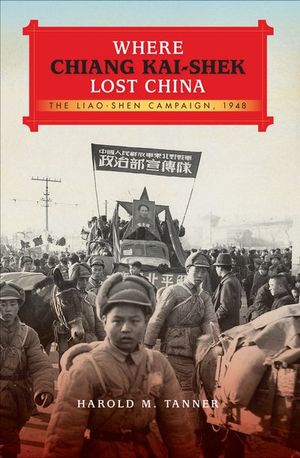Where Chiang Kai-shek Lost China
Published by Indiana University Press
“A masterful contribution not simply to the history of the civil war, but also to the history of 20th century China.” —Steven I. Levine author, Anvil of Victory: The Communist Revolution in Manchuria, 1945-1948)
The civil war in China that ended in the 1949 victory of Mao Zedong’s Communist forces was a major blow to U.S. interests in the Far East and led to heated recriminations about how China was “lost.” Despite their significance, there have been few studies in English of the war’s major campaigns. The Liao-Shen Campaign was the final act in the struggle for control of China’s northeast. After the Soviet defeat of Japan in Manchuria, Communist Chinese and then Nationalist troops moved into this strategically important area. China’s largest industrial base and a major source of coal, Manchuria had extensive railways and key ports (both still under Soviet control). When American mediation over control of Manchuria failed, full-scale civil war broke out. By spring of 1946, Chiang Kai-shek’s Nationalist armies had occupied most of the southern, economically developed part of Manchuria, pushing Communist forces north of the Songhua (Sungari) River. But over the next two years, the tide would turn. The Communists isolated the Nationalist armies and mounted a major campaign aimed at destroying the Kuomintang forces. This is the story of that campaign and its outcome, which were to have such far-reaching consequences.
“Where Chiang Kai-shek Lost China is more than a fluidly written battle narrative or operational history. By tapping an impressive array of archival materials, published document collections, and memoirs, Harold Tanner has put the Liao-Shen Campaign in the larger context of the Chinese Civil War and significantly advanced our understanding of the military history of modern China.” —Michigan War Studies Review
The civil war in China that ended in the 1949 victory of Mao Zedong’s Communist forces was a major blow to U.S. interests in the Far East and led to heated recriminations about how China was “lost.” Despite their significance, there have been few studies in English of the war’s major campaigns. The Liao-Shen Campaign was the final act in the struggle for control of China’s northeast. After the Soviet defeat of Japan in Manchuria, Communist Chinese and then Nationalist troops moved into this strategically important area. China’s largest industrial base and a major source of coal, Manchuria had extensive railways and key ports (both still under Soviet control). When American mediation over control of Manchuria failed, full-scale civil war broke out. By spring of 1946, Chiang Kai-shek’s Nationalist armies had occupied most of the southern, economically developed part of Manchuria, pushing Communist forces north of the Songhua (Sungari) River. But over the next two years, the tide would turn. The Communists isolated the Nationalist armies and mounted a major campaign aimed at destroying the Kuomintang forces. This is the story of that campaign and its outcome, which were to have such far-reaching consequences.
“Where Chiang Kai-shek Lost China is more than a fluidly written battle narrative or operational history. By tapping an impressive array of archival materials, published document collections, and memoirs, Harold Tanner has put the Liao-Shen Campaign in the larger context of the Chinese Civil War and significantly advanced our understanding of the military history of modern China.” —Michigan War Studies Review
BUY NOW FROM
COMMUNITY REVIEWS

